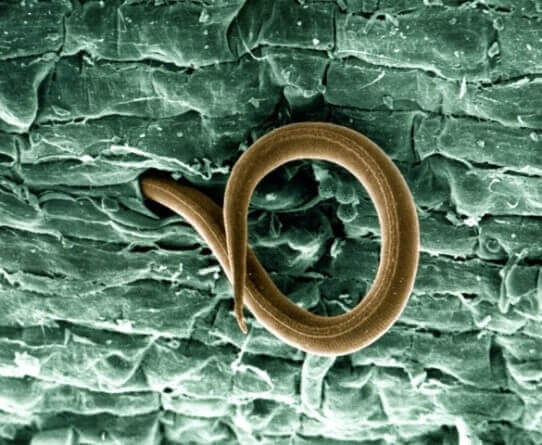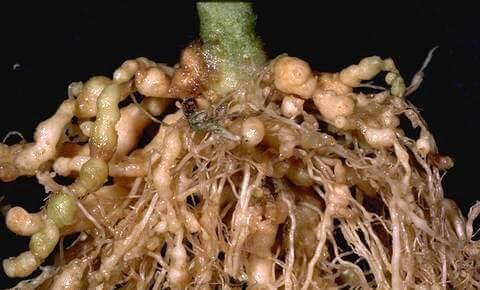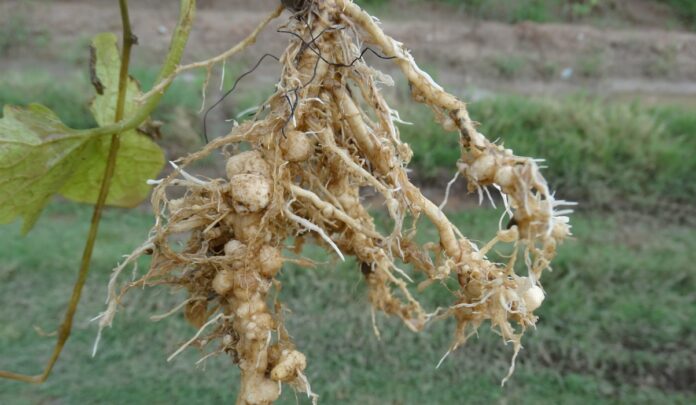What are nematodes?
Nematodes are very tiny and microscopic, worm-like organisms. They live freely in the soil and feed on plant roots for most of their life, making them very troublesome.

Read also: 10 Simple and Easy Soil Tests
How do nematodes damage plants?

Image source:ipm.ucdavis.edu
Root-knot nematodes cause the roots to swell and form galls. This symptom is very visible when the plants are uprooted and soil gently washed from the roots. The nematodes develop and feed within the galls.
When the galls form, the plant roots are not able to conduct nutrients and water to the plant well. The galls can crack and expose the plants to the soil-borne disease-causing organism. The galls may look like nodules of nitrogen-fixing legumes but cannot be plucked off.
Obvious symptoms, above ground, of nematode-infested plants, include; yellowing leaves and loss of vigour as if the plants lack moisture or nutrients. Plants which are heavily infested my die. Damage is more serious in warm, irrigated, sandy soils.
Read also: 6 Basic Soil Problems and Recommended Solutions in Agriculture
How can you control nematodes without chemicals?
Take preventive measures to reduce or prevent the effects of nematode infestation. Good farm sanitation, resistant plant varieties, land fallowing, crop rotation are among some of the popular control measures.
Management of nematodes are relatively difficult but with the combination of practices, nematodes should well be under control.
Read also: 10 Benefits of Cover Crops to Soil Improvement and Cropping
1. Practice good farm sanitation
To ensure effective nematodes control, avoid carrying infested plants or soils to new areas. Nematodes could be introduced to new areas. Be cautious and selective to chose nematode-free plants from reliable nurseries. Prevent water runoff on your farm. This can carry nematode-infested soils to new areas on your farm. If under irrigation, make sure water supplied to plants are just enough to prevent runoff. Farm tools and equipment used on soils with nematode infestation could also be media for the spread of nematode. Make sure to clean tools and equipment before use on your farm.
2. Chose resistant or tolerant varieties and rootstocks
Minimize the effects of nematodes with resistant vegetable varieties and fruit tree rootstalk. Some tomato varieties from trusted sources (labelled VFN – Verticillium, Fusarium, Nematodes) are resistant to root-knot nematode. Resistant varieties can still show some galling when there is the presence of nematode but does not affect yield.
Read also: Organic Farming: Types, Principles, Methods and Importance
3. Practice land fallow and rotation
Controlling root-knot nematode is not easy even with land fallow and rotation because many weeds could also host them.
However, with careful planning and combination, nematode numbers can be reduced. Sudangrass, some bean varieties and tomatoes varieties can be used in a rotation plan to reduce nematode populations.
Land fallow is when you leave the land to regain fertility after periods of cropping. Leaving the land to fallow for 1 year can reduce the population of root-knot nematode enough to successfully grow a susceptible annual crop. An extended fallow period can further reduce the population of root-knot nematode.
During the fallow period, it is important to keep the soil moist to induce hatching of nematode eggs and control weeds on which nematodes can survive. As a result, eggs will hatch, but nematodes will die if there is nothing to feed on.
Repeated fallow is necessary when root injury is detected as nematodes can build up to damaging levels in a single season.
4. Chose the right planting and harvesting dates
Most nematode species are active under warm temperatures. They are not very active and cannot penetrate roots at soil temperatures below 18°C. Plant early in the cool and wet seasons before they become active.
After harvesting, remove annual vegetables and their roots to prevent nematodes from feeding and breeding in the roots.
Read also: Types of Irrigation: Advantages and Disadvantages
5. Use nematode-suppressive Plants
Certain marigolds, Tagetes species, suppress root-knot and lesion nematodes. French marigolds (varieties include Nemagold, Petite Blanc, Queen Sophia, and Tangerine) are most effective. Avoid signet marigolds, T. signata or tenuifolia, because nematodes will feed and reproduce on these. Marigolds don’t work well against the northern root-knot nematode, Meloidogyne hapla, a species common in areas with cool winters. (ref: www.ipm.ucdavis.edu)
The effect of marigolds is greatest when you grow them as a solid planting for an entire season. When grown along with annual vegetables or beneath trees or vines (intercropping), nematode control usually isn’t very good. To prevent the marigold seed from getting into the soil, cut or mow the plants before the flowers open. As with other cultural control methods, nematode populations rapidly will increase as soon as you grow susceptible crops again. (ref: www.ipm.ucdavis.edu)
6. Apply soil amendments and irrigation
Adding organic soil amendments to the soil can reduce the effect of nematode on crops. Manure and compost improve water and nutrient retention of the soil especially sandy soils. When plants are water-stressed, nematodes damage them easily. Therefore increasing soil’s capacity to hold water would reduce the effects of nematode injury. Also, frequent irrigation makes water always available for the crops and help reduce the effect of nematodes. In either case, nematodes could be present in the soil but they will less damage.
The practice of conservation agriculture can also help check the effects of nematodes.


